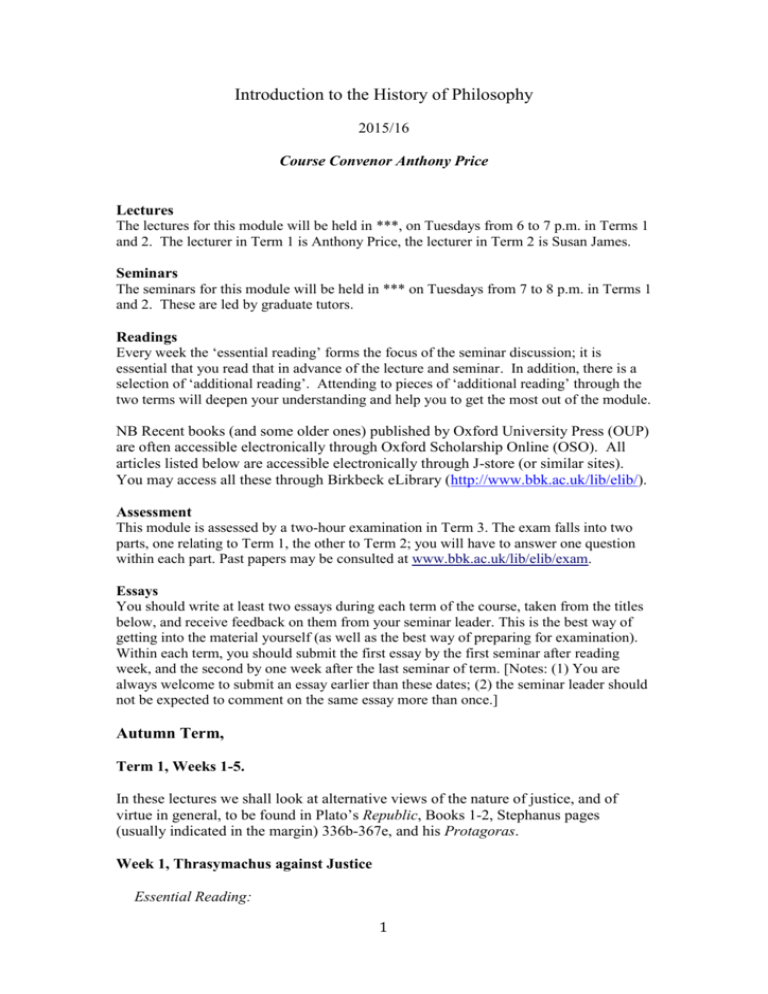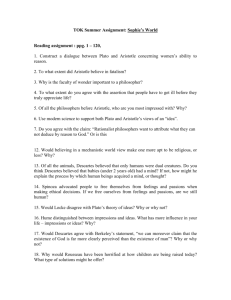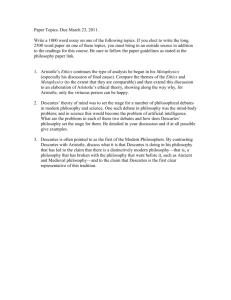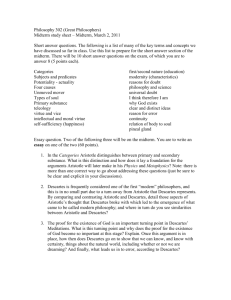Introduction to the History of Philosophy
advertisement

Introduction to the History of Philosophy 2015/16 Course Convenor Anthony Price Lectures The lectures for this module will be held in ***, on Tuesdays from 6 to 7 p.m. in Terms 1 and 2. The lecturer in Term 1 is Anthony Price, the lecturer in Term 2 is Susan James. Seminars The seminars for this module will be held in *** on Tuesdays from 7 to 8 p.m. in Terms 1 and 2. These are led by graduate tutors. Readings Every week the ‘essential reading’ forms the focus of the seminar discussion; it is essential that you read that in advance of the lecture and seminar. In addition, there is a selection of ‘additional reading’. Attending to pieces of ‘additional reading’ through the two terms will deepen your understanding and help you to get the most out of the module. NB Recent books (and some older ones) published by Oxford University Press (OUP) are often accessible electronically through Oxford Scholarship Online (OSO). All articles listed below are accessible electronically through J-store (or similar sites). You may access all these through Birkbeck eLibrary (http://www.bbk.ac.uk/lib/elib/). Assessment This module is assessed by a two-hour examination in Term 3. The exam falls into two parts, one relating to Term 1, the other to Term 2; you will have to answer one question within each part. Past papers may be consulted at www.bbk.ac.uk/lib/elib/exam. Essays You should write at least two essays during each term of the course, taken from the titles below, and receive feedback on them from your seminar leader. This is the best way of getting into the material yourself (as well as the best way of preparing for examination). Within each term, you should submit the first essay by the first seminar after reading week, and the second by one week after the last seminar of term. [Notes: (1) You are always welcome to submit an essay earlier than these dates; (2) the seminar leader should not be expected to comment on the same essay more than once.] Autumn Term, Term 1, Weeks 1-5. In these lectures we shall look at alternative views of the nature of justice, and of virtue in general, to be found in Plato’s Republic, Books 1-2, Stephanus pages (usually indicated in the margin) 336b-367e, and his Protagoras. Week 1, Thrasymachus against Justice Essential Reading: 1 • Plato, Republic, Book 1, Stephanus pages (given in the margin of most translations) 336b-354b (many good translations; the most reader-friendly in presentation is the Penguin translation, now with additional matter by Melissa Lane, by Desmond Lee) Additional Reading: • T. Irwin, Plato’s Ethics (OUP 1995), 174-80 • J. Annas, An Introduction to Plato’s Republic (OUP 1981), 34-58 • N. Pappas, Plato and the Republic (Routledge, 3rd edn 2013 – but previous edns are fine), ch. 3, first part • T.D.J. Chappell, ‘The Virtues of Thrasymachus’, Phronesis 38 (1993), 1-17 • R. Barney, ‘Callicles and Thrasymachus’ (2011), Stanford Encyclopedia of Philosophy (http://plato.stanford.edu/entries/callicles-thrasymachus/), §§ 2-3 Question: Is Thrasymachus’ position coherent? Does Socrates refute it by sound arguments? Week 2, Glaucon and Adeimantus on Justice as (at best) a Second Best Essential Reading: • Plato, Republic, Book 2, 357a-367e Additional Reading: • T. Irwin, Plato’s Ethics, 181-91 • N. Pappas, Plato and the Republic, ch. 3, second part • C. Kirwan, ‘Glaucon’s Challenge’, Phronesis 10 (1965), 162-73 • R.E. Allen ‘The speech of Glaucon in Plato’s Republic’, Journal of the History of Philosophy 25 (1987), 3-11 Question: How successful is the contract theory presented by Glaucon in defining the nature, and explaining the origin, of our concept of justice? Week 3, Protagoras on Virtue Essential Reading: • Plato, Protagoras, 320d-328d (I recommend the translation by C.C.W Taylor, published in OUP World’s Classics 1996, or in the Clarendon Plato Series with a full commentary, 2nd edn 1991) Additional Reading; • T. Irwin, Plato’s Ethics, 79-80 • G.B. Kerferd, ‘Protagoras’ Doctrine of Justice and Virtue in the Protagoras of Plato’, Journal of Hellenic Studies 73 (1953), 42-5 • M.C. Nussbaum, The Fragility of Goodness (CUP 1986), 100-6 Question: How successful is Protagoras in offering an aetiology (account of the origin) of human morality? 2 Week 4, Socrates on Acting against one’s Judgement Essential Reading: • Plato, Protagoras, 352a-357e Additional Reading: • T. Irwin, Plato’s Ethics, 83-4 • G. Santas, ‘Plato’s Protagoras and Explanations of Weakness’, Philosophical Review 75 (1966), 3-33 • G. Vlastos, ‘Socrates on Acrasia’, Phoenix 23 (1969), 71-88 • M.C. Nussbaum, The Fragility of Goodness, 113-17 • A.W. Price, Virtue and Reason in Plato and Aristotle (OUP 2011), pp. 253-69 Question: Does Socrates succeed in proving that it is impossible for an agent consciously to act against his own current judgment of how he should best act? Week 5, Socrates on the Unity of the Virtues Essential Reading: • Plato, Protagoras 328d-334c, 358d-360e Additional Reading: • T. Irwin, Plato’s Ethics, 80-1, 84-5 • G. Vlastos, ‘The Unity of the Virtues in the Protagoras’, Review of Metaphysics 25 (1971/2), 415-58 • T. Penner, ‘The Unity of Virtue’, Philosophical Review 82 (1973), 35-68 • D. Devereux, ‘The Unity of the Virtues in Plato's Protagoras and Laches’, Philosophical Review 101 (1992), 765–89 • A.W. Price, Virtue and Reason in Plato and Aristotle, pp. 86-100 Question How successful is Socrates in grounding a thesis that it is impossible to possess one virtue without possessing all the others? Term 1, Weeks 6-10. In these lectures we shall look at a selection of topics from Aristotle’s Nicomachean Ethics. (Any translation is fine, but W.D. Ross in the Oxford World’s Classics series, with an introduction by L. Brown, 2009, is recommended. Ross’s translation is also available online at e.g. http://classics.mit.edu/Aristotle/nicomachaen.html [sic]) Week 6, Aristotle on eudaimonia (acting and living well) Essential Reading: Aristotle, Nicomachean Ethics, Book 1, chs 1-5, 8-12 Additional Reading: 3 J.O. Urmson, Aristotle’s Ethics (Blackwell 1988), ch. 1 M. Pakaluk, Aristotle’s Nicomachean Ethics (CUP 2005), ch. 2 J.L. Ackrill, ‘Aristotle on eudaimonia’, Proceedings of the British Academy 60 (1974), 339-59; repr. in A.O. Rorty ed., Essays on Aristotle’s Ethics (California 1980), 15-33 A.W. Price, ‘Eudaimonism and Egocentricity’, The Harvard Review of Philosophy 19 (2013), 84-95 (accessible through my site at academia.edu) Question Can Aristotle make out a claim that the agent’s eudaimonia is the final goal of all his or her actions? If so, are we all self-centred? Week 7, Aristotle’s Function Argument Essential Reading: Aristotle, Nicomachean Ethics, Book 1, chs 7, 13 Additional Reading: J.O. Urmson, Aristotle’s Ethics, pp. 19-22 M. Pakaluk, Aristotle’s Nicomachean Ethics, pp. 74-82 K.V. Wilkes, ‘The Good Man and the Good for Man in Aristotle’s Ethics’, Mind 87 (1978), 553-71; repr. in Rorty ed., Essays on Aristotle’s Ethics, 341-57 Korsgaard, C., ‘Aristotle’s Function Argument’, in her The Constitution of Agency (OUP 2008), 129-50 Question Does man have a function? Supposing that he does, to what extent can it help to define the human good? Week 8, Aristotle on virtue of character Essential Reading: Aristotle, Nicomachean Ethics, Book 2 Additional Reading: J.O. Urmson, Aristotle’s Ethics, ch. 2 M. Pakaluk, Aristotle’s Nicomachean Ethics, ch. 3 J.O. Urmson, ‘Aristotle’s Doctrine of the Mean’, American Philosophical Quarterly 10 (1973), 223-30 R. Hursthouse, ‘A False Doctrine of the Mean’, Proceedings of the Aristotelian Society 81 (1980/1), 57-72 R. Hursthouse, ‘The Central Doctrine of the Mean’, in R. Kraut ed, Blackwell Guide to Aristotle’s Nicomachean Ethics (Blackwell, 2006), 96-115 Question: How can we best make sense of Aristotle’s doctrine of the mean? Week 9, Aristotle on responsibility 4 Essential Reading: Aristotle, Nicomachean Ethics, Book 2, chs 1, 5 Additional Reading: J.O. Urmson, Aristotle’s Ethics, pp. 42-9, 59-61 G.J. Hughes, Routledge Guidebook to Aristotle’s Nicomachean Ethics (Routledge 2013), ch 7 M. Pakaluk, Aristotle’s Nicomachean Ethics, pp. 119-29, 143-9 S.S. Meyer, Aristotle on Moral Responsibility (OUP 2011), chs 4-5 Question What, in Aristotle’s view, can make agents not responsible for what they do? Week 10, Aristotle on the Ideal Life Essential Reading: Aristotle, Nicomachean Ethics, Book 10, chs 6-9 Additional Reading: J. O. Urmson, Aristotle’s Ethics, ch. 10 M. Pakaluk, Aristotle’s Nicomachean Ethics, ch. 11 A.W. Price, Virtue and Reason in Plato and Aristotle, pp. 69-80 G. Lawrence, ‘Aristotle and the Ideal Life’, Philosophical Review 102 (1993), 1-34 Question Can Aristotle establish that the best human life is intellectual? Where does this leave the claims of the ethical life? 5 Spring Term Course Schedule Living and Living Well in Early Modern Philosophy What makes a thing alive? And what is it to die? For early-modern European philosophers these questions were fraught with philosophical, ethical and theological implications. In the first seven weeks we shall consider some of the answers defended by dualists, monists, materialists and vitalists, which contributed to a rich seventeenth-century debate about life itself. As well as contrasting the living and the dead, some philosophers argued that human beings could be more or less fully alive. In the final three weeks of term we shall discuss the suggestion that a virtuous person is in some sense more alive than a vicious one. Readings Every week the ‘essential reading’ forms the focus of the seminar discussion; it is essential that you read that in advance of the lecture and seminar. In addition, there is a selection of ‘additional reading’. Attending to pieces of ‘additional reading’ through the two terms will deepen your understanding and help you to get the most out of the module. All essential and additional readings will be available on Moodle. You can also access many of them through the Birkbeck College e-library. (http://www.bbk.ac.uk/lib/elib/). Week by Week Outline Section I, Weeks 1-7: Being Alive and Being Dead Week 1 Life and Soul: Aristotle on Living Things Required Reading: Aristotle, On the Soul, Book 2, 1-5 (i.e. 412.1 – 418.1); Book 3, 3- end of 4 (i.e. 427.1 – 4.30.1). Additional Reading: Michael Frede, ‘Aristotle on the Soul’ in M. Nussbaum and A. Rorty, Essays on Aristotle’s De Anima, available at Oxford Scholarship Online. Week 2 Rejecting Aristotle: Descartes on Living Machines Required Reading: 6 Descartes, Principles of Philosophy, Part 2, sections 1 – 36. Descartes, Discourse on the Method, Part 5. Additional Reading: Susan James, 'The Emergence of the Cartesian Mind' in T. Crane and S. Patterson (eds), The History of the Mind-Body Problem Question: How plausibly does Descartes defend the view that a thing can be alive without having a soul? Further Reading Dennis Des Chene, ‘Aristotelian Natural Philosophy’ in Carriero and Broughton eds., A Companion to Descartes. *Desmond Clarke, ‘Descartes’s philosophy of science and the scientific revolution’ in John Cottingham ed., The Cambridge Companion to Descartes. Daniel Garber, ‘Semel in vita: The Scientific background to Descartes’ Meditations’. Stephen Gaukroger, ‘Descartes on Mindless Animals’ at http://openjournals.library.usyd.edu.au/index.php/ART/article/view/5595/6264 Peter Harrison, ‘Descartes on Animals’, Philosophical Quarterly, April 1992 * Garry Hatfield, ‘Animals’ in Carriero and Broughton eds. A Companion to Descartes Week 3 The Limits of Mechanism; Cartesian Dualism Required Reading: Descartes, Meditations 1 and 2. Descartes, Principles of Philosophy Part 1, 51- 65. Additional Reading: John Cottingham, ‘Cartesian Dualism: Theology, Metaphysics and Science’, in Cottingham ed., The Cambridge Companion to Descartes Question: What does Descartes mean by thinking? Why does he believe a human being needs a soul to think? Further Reading Descartes, Meditation 6 *Marleen Rozemond, ‘The Real Distinction’ in Carriero and Bourghton eds., A Companion to Descartes Amelie Rorty, ‘Cartesian Passions and the Union of Mind and Body’ in A. Rorty ed., Essays on Descartes’ Meditations Week 4 Questioning Dualism: Descartes and Princess Elisabeth Required Reading: a) Descartes and Hobbes, Third Set of Objections and Replies to the Meditations, Objections 1-3 and Descartes’ replies to them. 7 b) Descartes and Princess Elisabeth, Correspondence with the Princess Elisabeth – 6th May to 1st July 1643. Additional Reading: Lisa Shapiro, ‘Princess Elisabeth and Descartes: The Union of Mind and Body and the Practice of Philosophy’ British Journal for the History of Philosophy , Volume 7, no. 3, October, 1999. Reprinted in Feminism and the History of Philosophy , ed. G. Lloyd. Question: Does Descartes have a satisfying argument for his view that a human being is a composite of soul and body? Further Reading See further reading for week 3 plus: *Lisa Shapiro, “Cartesian Selves” in Descartes’s Meditations: A Critical Guide, ed. Karen Detlefsen, Cambridge UP, (January 2012), pp. 226-242. John Cottingham, ‘Cartesian Trialism’, Mind 1965. Jasper Reid (2008) ‘The Spatial Presence of Spirits among the Cartesians’, Journal of the History of Philosophy, 46 (1), pp. 91–118. Week 5 Opposing Mechanism I: Cavendish on Matter Required Reading: a) Margaret Cavendish, Philosophical Letters, Letters 30-45 on Descartes. b) Margaret Cavendish, Observations on Experimental Philosophy, sections 31, 35, 36, 37. Additional Reading: Karen Detlefsen, ‘Atomism, Monism and Causation in the Philosophy of Margaret Cavendish’ Question: Assess Cavendish’s attempt to overcome what she sees as the deficiencies of mechanism. Further Reading Jacqueline Broad, Women Philosophers of the Seventeenth Century, chapter 2. (Good introduction.) Stewart Duncan (2012). Debating Materialism: Cavendish, Hobbes, and More. History of Philosophy Quarterly 29 (4):391-409. Susan James (1999). The Philosophical Innovations of Margaret Cavendish. British Journal for the History of Philosophy 7. *Catherine Wilson (2007). Two Opponents of Material Atomism: Cavendish and Leibniz. In P. Phemister & S. Brown (eds.), Leibniz and the English-Speaking World. READING WEEK Week 6 Opposing Mechanism II: Cudworth on Plastic Natures Required Reading: 8 Ralph Cudworth, ‘The Plastick Life of Nature’ in C.A. Patrides, The Cambridge Platonists, pp. 288-325. Justin Smith, ‘Machines, Souls and Vital Principles’ in D. Clarke and C. Wilson eds., The Oxford Handbook of Philosophy in Early Modern Europe, pp. 96-115. Question: Does Cudworth offer compelling reasons for positing plastic natures? Further Reading Walter Ott, Causation and Laws of Nature in Early Modern Philosophy, ch. 15. Breteau, ‘Chaos and Order in Cudworth’s Thought’ in Douglas Hedley and Sarah Hutton eds., Platonism at the Origins of Modernity. *John Henry, ‘Occult qualities and the experimental philosophy’, History of Science, 1986. (Note: the secondary literature on Cudworth is comparatively thin.) Week 7 Accommodating Mechanism: Spinoza’s Monism Required reading: Genevieve Lloyd, Spinoza and the ‘Ethics’, ch. 2, pp. 29-70. Additional reading: Spinoza, Ethics, Part II up to proposition 13, including the first part of P13. Question: Can we make sense of Spinoza’s claim that a mind and a body are the same thing? Section II, Weeks 8-10: Living Fully Week 8 Coping with the passions: Descartes and Princess Elisabeth on the good life Required reading: Descartes, Discourse on the Method, parts 1-3. Descartes and Princess Elisabeth, Correspondence 1st Sept 1645 – 3 Nov 1645. Additional Reading: Frierson, Patrick R., 2002. “Learning to Love: From Egoism to Generosity in Descartes,” Journal of the History of Philosophy, 40: 313–348. Question: How does Descartes think generosity is related to living well? Week 9 Virtue as Activity: Spinoza on Empowerment Required Reading: Spinoza, Ethics, Part III up to Proposition 15. Additional Reading: Michael Le Buffe, ‘The Anatomy of the Passions’ in Olli Koistinen ed., The Cambridge Companion to Spinoza’s ‘Ethics’, pp. 188-222. Question: How does Spinoza defend his view that human beings strive to empower themselves? 9 Week 10 Virtue as Activity: The Character of an Active Life Required Reading: Spinoza, Ethics, Part IV, propositions 19-40 and propositions 64-73. Additional Reading: Moira Gatens and Genevieve Lloyd, Collective Imaginings: Spinoza Past and Present, chapter 3, pp. 41-57. Question: Why, according to Spinoza, does the free man think of nothing less than death? 10








